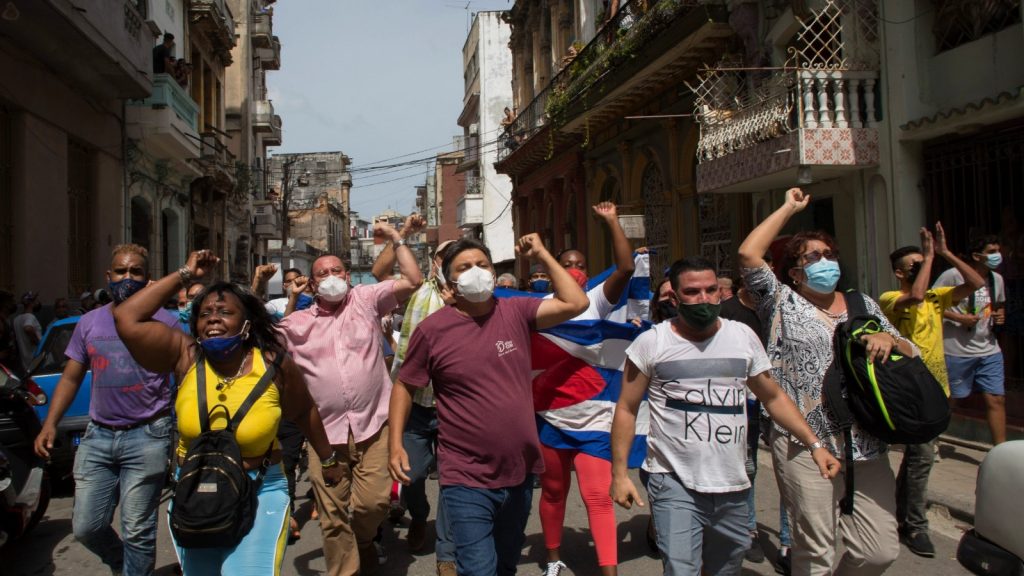Thousands took to the streets of Cuba on Sunday in some of the country’s biggest mass demonstrations in decades to protest food and vaccine shortages, increasing prices of food, medicine and other necessities, and the deteriorating quality of life on the island. Already struggling under a six-decade U.S. embargo, the Covid-19 pandemic and sanctions by the Trump and Biden administrations — alongside economic austerity imposed by the Miguel Díaz-Canel government — have only made matters worse.
The protests began in the towns of San Antonio de los Baños and Palma Soriano and demonstrators numbered a few hundred, but word quickly spread and, by the afternoon, thousands had taken to the streets in Havana and Santiago, with some chanting “freedom” and demanding that President Díaz-Canel step down. The protests were met with severe repression by both uniformed and plainclothes police officers. The police used pepper spray and truncheons, arresting about two dozen protesters, including Leftist activists like the Marxist Frank García who are critical of the one-party bureaucracy.
The demonstrations, with their initial size and the expression of just demands, is just the tip of an iceberg created by the brutal imperialist embargo and the government’s adaptations to the pressures of a global capitalist economy. However, they have strong contradictions that could make them susceptible to the intervention of global capitalism, and U.S. imperialism in particular, which will seek to influence and ultimately co-opt the demonstrations in the interest of capitalism.
The protests were also heterogeneous in content: on one hand, right-wing groups behind the “Patria y Vida” movement and the church tried to capitalize on the general discontent to strengthen an anti-communist discourse. These sectors used slogans like “Patria y Vida” (Homeland and Life) and “Libertad” (Freedom) which are promoted by right-wing sectors that favor policies of greater economic openness and pro-market reforms. The mobilizations also express a social base that has been developing as a result of the economic reforms promoted by Raúl Castro beginning in 2010: now, with access to U.S. dollars, these sectors have been allowed to do business and exploit labor, albeit in a manner controlled and limited by the state. On the other hand, workers, artists, youth and left-wing activists mobilized spontaneously and independent of the right, with slogans like “Socialism yes, repression no.”
What Led to the Protests?
The protests in Cuba come in the midst of the worst economic recession in 30 years, one that has been made worse by the pandemic. For months, videos circulated on social media have shown people voicing anger over the shortage of basic necessities, the long lines for food, and the government’s mismanagement of the pandemic.
The recession comes in the context of a six-decade-long U.S. embargo that has stifled the island. The Trump administration, furthermore, placed 200 additional sanctions on the island under a campaign of “maximum pressure,” aimed at further squeezing the island’s economy — measures that have been continued by the Biden administration. According to the latest reports, in just the period of March 2019-2020, the embargo has caused an estimated $5.57 billion in damages to the Cuban economy. As the pandemic rolled in, the effect of these sanctions have only proven more disastrous, especially as the country’s primary industry, tourism, took a heavy hit. Because of Covid-19, Cuba lost over three million tourists in 2020, which was 76.4 percent fewer tourists from 2019. The country’s gross domestic product fell by 11 percent. With businesses and restaurants still shuttered, many Cubans are now unable to work, all while monthly remittances were cut. In the meanwhile, under the influence of U.S. imperialism, Cuba’s trade relations with one of its biggest partners, Venezuela, were further worsened as the Juan Guaidó-controlled National Assembly voted to decrease Venezuelan oil exports to Cuba, cutting one of Cuba’s primary sources of oil.
This comes as the Delta variant has led to a spike in new Covid cases in the country, with 6,923 more infections and 47 deaths reported on Sunday alone. Although Cuba has a mass vaccination program underway with the goal of vaccinating the majority of the population by September, this has been slow moving. While Cuba is producing high-efficacy vaccines, it is unable to administer them rapidly due to the lack of syringes, a direct result of current sanctions.
But even before the pandemic hit, the Díaz-Canel government had been implementing the “Ordering Task” which combines a harsh austerity plan against the Cuban working class with increasingly opening up of the economy to capitalist investment. Among the main measures was ending the circulation of the Cuban Convertible Peso (CUC; the substitute currency for the dollar) and returning to the legal circulation of the dollar and the Cuban peso, which meant a huge devaluation.
U.S. Imperialism
The current conditions in Cuba are a direct result of U.S. imperialism, sustained by the bipartisan regime since the revolution that overthrew capitalism on the island. Imposed in 1960, the embargo against Cuba was retaliation to the nationalisation of American-owned oil refineries without compensation. What started as an embargo on exports except food and medicine expanded to all exports within two years. Since 2000, the embargo no longer prohibits the trade of food and humanitarian supplies, but continues to have a crippling effect on the Cuban economy.
Since 1992, Cuba has brought the demand to end the U.S. embargo every year in front of the UN — a motion that is approved annually with the overwhelming support of the international community with the deafening exception of the U.S. and its closest ally, Israel. The non-binding request was, in fact, introduced again just three weeks ago, and was approved with 184 votes in favor, two against (USA and Israel), and three abstentions (Colombia, Ukraine, and the United Arab Emirates).
For years, the U.S. has hidden behind the excuse of fighting for “freedom” and “democracy” in Cuba while continuing to implement an embargo that starves the very people it claims to want to “free.” This claim has been repeated in the past 24 hours by U.S. politicians on both sides of the aisle. In a press conference last evening, the mayor of Miami, Francis Suarez, called for an international intervention in Cuba led by the United States.
In an official statement from the White House today, President Joe Biden regurgitated the usual talking points of fighting for “freedom” from the “oppression” of communism, saying, “We stand with the Cuban people and their clarion call for freedom and relief from the tragic grip of the pandemic and from the decades of repression and economic suffering to which they have been subjected by Cuba’s authoritarian regime.”
It is ironic that the bipartisan political regime in the United States, along with right-wing Cubans who frequently take to the streets in Miami, paint this fight against Cuba as one for freedom. These are the same forces that supported not just the right-wing coup in Bolivia and continue to support coup plotters like Juan Guaidó in Venezuela, but have also been giving millions in military aid to Israel every year to crush Palestinians and further Israeli occupation. For the United States, the need to discipline Cuba and restore capitalism on the island continues to be key in its quest to establish its hegemony in Latin America and globally.
The Misleadership of the Cuban Communist Party
But, to place the blame of the conditions of the Cuban working class solely at the feet of imperialism would be to grossly overlook the betrayals of Cuba’s one-party regime.
The Cuban revolution was historic. Having taken power after a prolonged armed guerrilla struggle followed by a surgical insurrection of the working class in Havana during the revolution’s decisive days, the petit-bourgeois leadership of the July 26 Movement found itself forced to undertake a program of land distribution, expropriation of foreign capital, and nationalization of major industries. At the same time, Castro worked quickly to control the mass movement while strengthening ties with Stalinism, both in the Soviet Union and at home, enacting a repressive regime that persecuted political dissidents. By 1962, Castro had started taking increasingly Bonapartist measures — he ordered all revolutionary tendencies to fold into a United Party of the Cuban Socialist Revolution, which became The Communist party of Cuba in 1965 and, eventually, the only official organization in Cuba, with Castro at its head.
Thus, instead of developing the democratic self-organization of workers and peasants, guerillas substituted the working class as the revolutionary subject, and political power and governance became concentrated in the hands of the party bureaucracy. Although the revolution has smashed the old semi-colonial capitalist state, the tasks of the revolution itself were cut short, leading to the formation of a deformed worker’s state.
Since then, as in the USSR, the Communist Party bureaucracy has only paved the way for capitalist restoration in Cuba. The process of liberalization that was started by the Raúl Castro regime is now rapidly continuing with the Díaz-Canel government. The “Ordering Task” was yet another step towards this restoration of capitalism. This new plan has two central characteristics. On the one hand, there is severe austerity for the masses in the form of inflation and cuts in “undue subsidies and free services,” as the government cynically calls them. This came with the withdrawal of the CUC from circulation on January 1 and the implementation of a single exchange rate of 24 pesos (CUP) = $1, which resulted in the devaluation of the currency by 2400 percent. On the other hand, there is a new battery of measures to “attract foreign investment” and strengthen the so-called private sector, the small and medium-sized merchants and businesspeople who employ no more than a few dozen people. The aim of these measures is to facilitate foreign investment with an ambitious “portfolio of opportunities” with more than 500 projects, mainly in tourism and oil, for $12 billion. But the most important measure was the announcement of the end of the obligation of majority-Cuban state participation in investments in tourism, biotechnology, and wholesale trade, opening the path completely to private investment in what is perhaps Cuba’s most important industry.
The one-party bureaucracy in Cuba is, has long been, part of the problem. They implement austerity for the masses while reaping the benefits of foreign investment and maintaining the privileges of the bureaucracy. They prohibit the organization, deliberation, and publication of ideas by all people who defend the revolution — which today is only allowed for the Communist Party and the mass organizations it controls — therefore eschewing their left opposition. In yesterday’s protests, the regime wasted no time in cracking down on all dissidents, including those who want to continue the revolution. An example is the arrest of Frank García Hernández, a Cuban Marxist, sociologist, and historian, and a member of the Communists Blog collective; Marco Antonio Pérez Fernández, a high school student, who had been arrested on April 30 for carrying a sign “Socialism yes, repression no” Maikel Gonzalez Vivero, director of the LGTBQ community magazine, Tremenda nota, and others. Instead of relying on the working masses and supporting and developing their struggles throughout the continent, Communist Party relies on the liberal sectors and tendencies that work to restore capitalism.
In a press conference yesterday, Díaz-Canel denounced U.S. imperialism, painting all protesters as counterrevolutionary and asked for “revolutionaries” to take to the streets and “defend the revolution.” Indeed, we reject the right wing, the church, and the “Patria y Vida” movement that continue to capitalize on this discontent over the situation in Cuba, attempt to stifle the pending conquests of the revolution, and set the path for capitalist restoration. Yet, we must be clear: the defense of the revolution is not the same as the defense of a bureaucracy that gives concessions to capital while plunging its working and poor masses further into poverty. Today, the Communist Party uses the revolution as a cover to delegitimize its detractors. To defend the revolution, we must unequivocally reject the misleadership of the Communist Party and stand in support of the gains of the revolution made by the working class through the expropriation of capital.
Fight against imperialism and internal repression
The protests have strong contradictions as we pointed out at the beginning that could make them easy to bend towards a pro-capitalist solution. The measures taken by the Cuban government, far from defending the revolution, have helped generate the conditions that have led to these demonstrations – in part a result of the demoralization of the Cuban masses who see a privileged and entrenched bureaucracy that only knows how to ask for more sacrifices.
As socialists, we strongly and unequivocally reject any kind of U.S. imperialist intervention and demand an immediate end to the embargo and sanctions. Capitalism has nothing to offer the island, as can be seen in the unrelenting poverty in Latin America. The mass rebellions in Chile and Colombia are just a few examples of the failures of capitalism and neoliberalism. As socialists in the belly of the imperialist beast, we must be ready to take to the streets in the U.S. against any attempt to intervene in Cuba.
The defense of the revolution, however, is not a defense of the Communist Party bureaucracy which is entrenched in the state, but of the gains made by the working class in the revolution to expropriate the capitalists. For decades, the bureaucracy has been scrupulously maintaining its privileges, associating itself with foreign capital, opening up private investments, and systematically degrading the nationalized economy, the monopoly of foreign trade, and other social gains — all of which squanders and diminishes the gains of the revolution.
We defend the right to demonstration and union organization of those who fight to defend and deepen the conquests of the Cuban Revolution. We call for an immediate release of the political prisoners that defend the revolution, joining the campaign for the immediate release of Frank and his comrades.
The right-wing, both inside and outside the island, have fought for decades to fully restore capitalism. Today, they seek to take advantage of the protests and discontent to strengthen their goals and attack and dismantle what remains of the social victories. The present crisis can only be solved through a new revolutionary intervention of the masses that puts a brake on the restorationist course, throws out the bureaucracy, and puts an end to its one-party regime — and its prohibition on any organization outside the Communist Party. That is the way forward to create a genuine workers’ government based on the self-organization of the masses and on workers’ democracy, with full freedom of organization for anyone who defends the gains of the revolution and stands against imperialism and its designs for Cuba.












